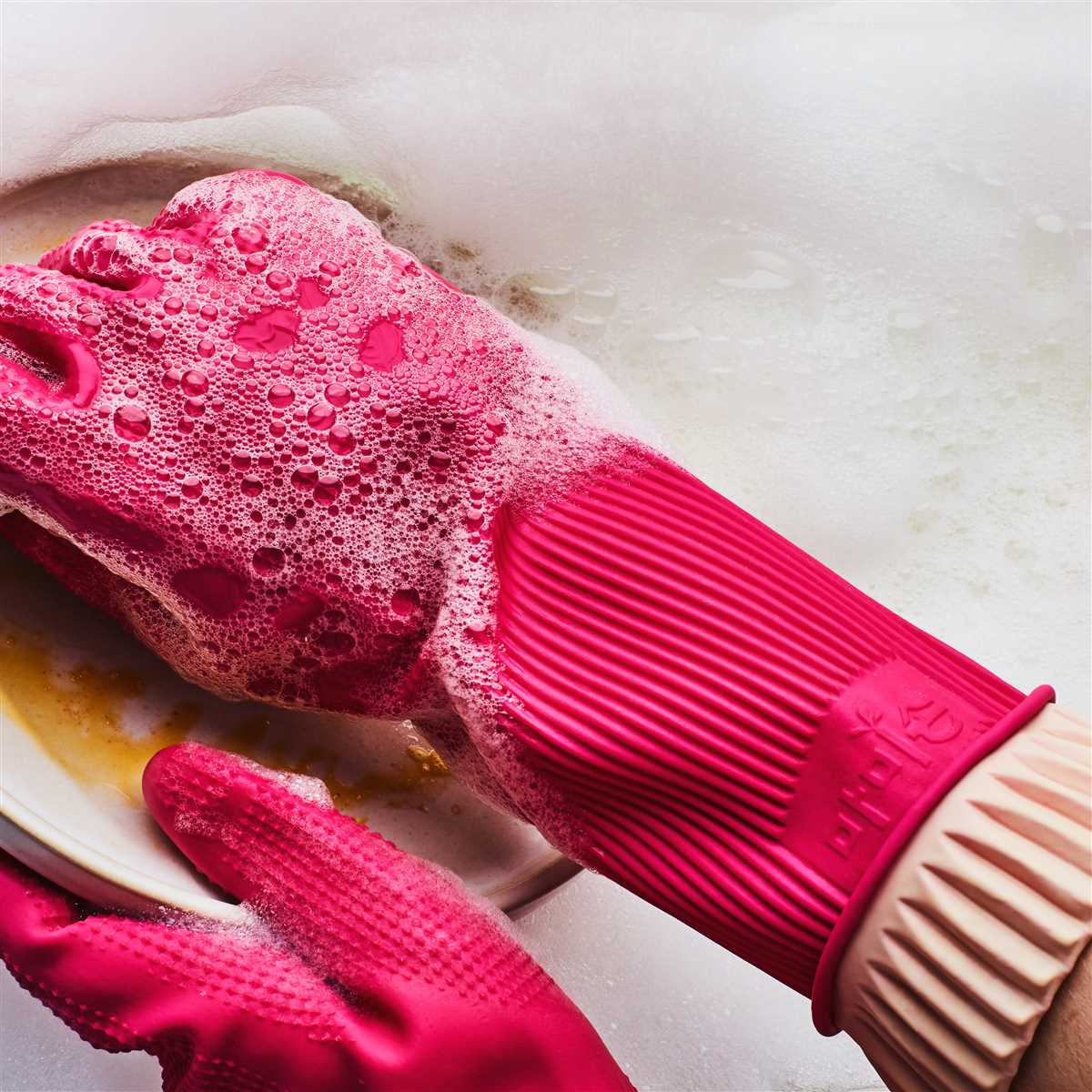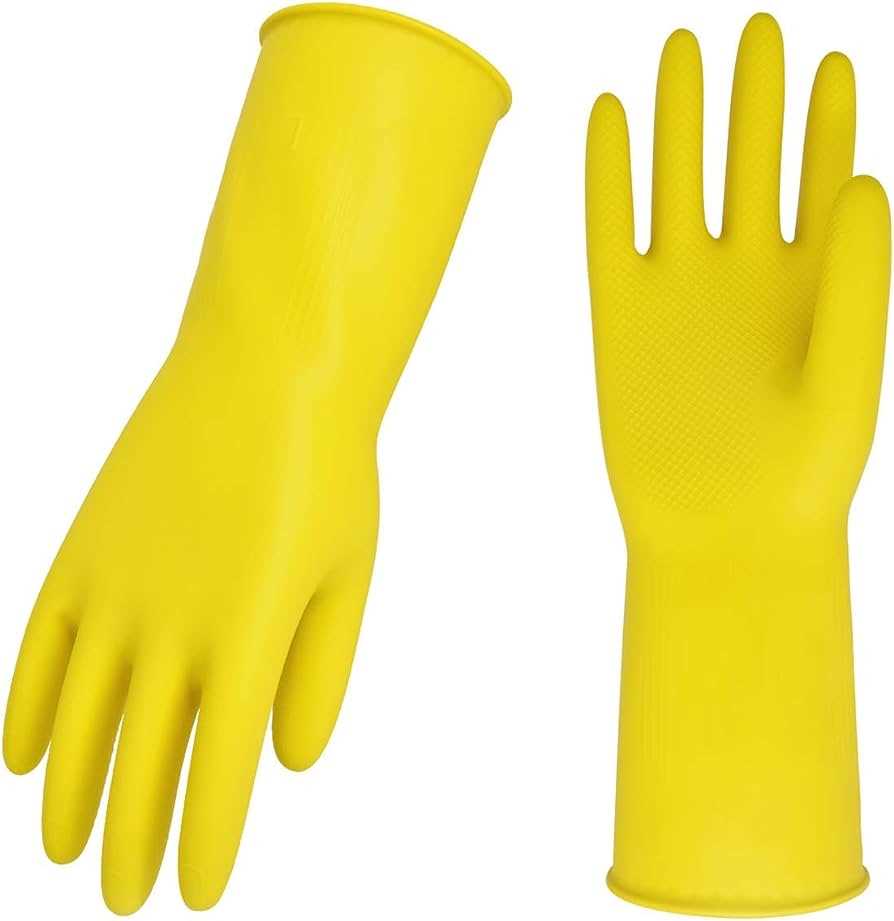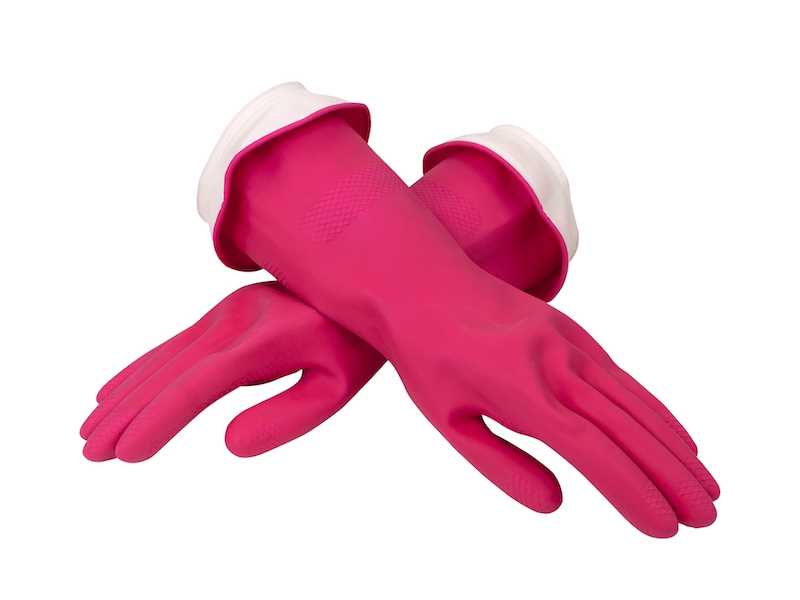




When it comes to washing dishes, having the right pair of rubber gloves can make all the difference. Not only do they protect your hands from hot water and harsh chemicals, but they also provide a better grip on slippery dishes.
But with so many options available, finding the best rubber gloves for dishwashing can be a daunting task. That’s why we’ve done the research for you and narrowed down the top picks.
Whether you’re looking for gloves that are durable, waterproof, or comfortable to wear, we’ve got you covered. Read on to discover the best rubber gloves for dishwashing that will make your time in the kitchen much easier and more enjoyable.
1. Playtex Living Reusable Rubber Gloves
These gloves are not only durable and waterproof, but they are also lined with a soft cotton flocking that makes them incredibly comfortable to wear. They also have a textured palm for a better grip, allowing you to easily hold onto slippery dishes.
2. Casabella Premium Water Stop Gloves
If you’re tired of getting water seeping into your gloves, these Casabella gloves are for you. They have a patented design with a double cuff that creates a water stop barrier, keeping your hands dry even during the toughest dishwashing tasks. The gloves are also made from high-quality latex for added durability.
3. LANON Wahoo Series Reusable Cleaning Gloves
These gloves are not only great for dishwashing but also for other household cleaning tasks. They are made from natural latex and are lined with a soft cotton flocking for extra comfort. The gloves also have a textured palm and fingers for a better grip and are resistant to punctures and tears.
With these top picks, you can say goodbye to dishwashing woes and hello to clean and dry hands. Choose the best rubber gloves for dishwashing and make your time in the kitchen a breeze.
Choosing the Right Rubber Gloves for Dishwashing
Dishwashing can be a messy and unpleasant task, but having the right pair of rubber gloves can make the experience much more manageable. When it comes to choosing the best rubber gloves for dishwashing, there are a few important factors to consider.
Material
One of the first things to consider when selecting rubber gloves for dishwashing is the material. The most common materials used for dishwashing gloves are latex, nitrile, and vinyl. Each material has its own advantages and disadvantages. For example, latex gloves are known for being flexible and comfortable, but they can cause allergies in some individuals. Nitrile gloves are resistant to chemicals and punctures, making them a durable option, but they can be less comfortable to wear for extended periods. Vinyl gloves are the most affordable choice, but they are not as durable or resistant to chemicals as latex or nitrile gloves.
Size and Fit
The size and fit of the rubber gloves are crucial for comfort and ease of use. Ill-fitting gloves can cause discomfort and make it difficult to grip dishes and utensils properly. When choosing rubber gloves, it’s important to select a size that fits snugly but allows for some movement. Many manufacturers offer gloves in different sizes, so it’s worth measuring your hand and referring to the sizing chart provided by the manufacturer to ensure you choose the right size.
Grip
Having a good grip is essential when washing dishes, as it allows you to handle slippery items with ease. Look for rubber gloves that have textured palms or fingers to enhance grip. These textured surfaces can help prevent dishes from slipping out of your hands, reducing the risk of breakage and potential injury.
Thickness
The thickness of the gloves can also make a difference in their durability and ability to protect your hands. Thicker gloves tend to be more resistant to tears and punctures but may sacrifice some dexterity. Thinner gloves, on the other hand, offer greater flexibility and tactile sensitivity, but they may not provide as much protection against sharp objects.
In conclusion, choosing the right rubber gloves for dishwashing involves considering factors such as material, size and fit, grip, and thickness. By taking these factors into account, you can find a pair of gloves that not only protects your hands but also provides comfort and ease of use during your dishwashing routine.
The importance of using rubber gloves while dishwashing

Dishwashing is a common household chore that many people tend to overlook. However, it is important to remember that maintaining proper hygiene while cleaning dishes is crucial for preventing the spread of bacteria and maintaining personal health. One effective way to ensure cleanliness and protect hands from potential harm is by using rubber gloves.
Rubber gloves provide a barrier between the hands and the soapy water, preventing the skin from coming into direct contact with harsh chemicals and hot water. This is particularly beneficial for individuals with sensitive skin or those who are prone to developing dryness or irritation. By wearing gloves, one can minimize the risk of skin allergies, dermatitis, or other skin conditions that may arise from regular exposure to dishwashing chemicals.
Furthermore, using rubber gloves can help maintain proper hand hygiene. While dishwashing, it is important to wash dishes at a higher water temperature to effectively remove bacteria and food residues. However, hot water can strip the natural oils from the skin, leading to dryness and discomfort. By wearing gloves, one can comfortably clean dishes with hot water without worrying about damaging the skin’s protective barrier.
Rubber gloves also provide an extra layer of protection against sharp objects that may be present while handling dishes. Broken glass or knives can cause serious injuries if they come into direct contact with the hands. Wearing gloves significantly reduces the risk of cuts or wounds, ensuring that dishwashing remains a safe and accident-free task.
In conclusion, using rubber gloves while dishwashing is essential for maintaining hygiene, protecting the skin, and preventing potential injuries. By investing in a good pair of rubber gloves, one can ensure a more comfortable and safe dishwashing experience.
Features to consider when buying rubber gloves for dishwashing
When it comes to choosing the best rubber gloves for dishwashing, it’s important to consider a few key features. These features can make a significant difference in terms of comfort, durability, and overall performance. Here are some important factors to keep in mind:
- Material: Look for gloves made from high-quality rubber or latex material. These materials are known for their durability and resistance to tears, ensuring that your gloves will last longer and provide better protection.
- Thickness: Consider the thickness of the gloves. Thicker gloves provide better protection against hot water and sharp objects, but they may also reduce dexterity. Thinner gloves, on the other hand, may offer more flexibility but may not provide as much insulation or durability.
- Size: Choosing the right size is crucial for a comfortable fit. Gloves that are too tight can cause discomfort and restrict movement, while gloves that are too loose may slip off or make it difficult to grip objects properly. Try on different sizes to find the perfect fit.
- Cuff length: Consider the length of the gloves’ cuffs. Longer cuffs provide extra protection and prevent water from seeping in, while shorter cuffs may be more comfortable and allow for more freedom of movement.
- Lining: Some rubber gloves come with a lining, such as cotton or flocking, which can provide added comfort and absorb sweat. This can be particularly beneficial for those who need to wear gloves for extended periods of time.
- Grip: Look for gloves with textured surfaces or enhanced grip features. This can help you hold onto slippery dishes and utensils more securely, reducing the risk of accidents and breakages.
- Chemical resistance: If you often work with harsh cleaning chemicals, consider gloves that offer chemical resistance. This will ensure that your hands are protected from potential irritants and allergens.
By considering these features when purchasing rubber gloves for dishwashing, you can find a pair that meets your specific needs and preferences. Remember to prioritize comfort, durability, and functionality to make your dishwashing experience more efficient and enjoyable.
Benefits of Using Rubber Gloves for Dishwashing
When it comes to doing the dishes, using rubber gloves can provide several advantages. They not only protect your hands from direct contact with hot water and chemicals but also offer other benefits that make dishwashing easier and more efficient.
1. Skin Protection
One of the main benefits of using rubber gloves for dishwashing is that they offer excellent protection for your skin. The hot water and harsh chemicals found in dishwashing liquids can strip the natural oils from your hands, leaving them dry and irritated. Wearing rubber gloves creates a barrier between your skin and these elements, preventing damage and maintaining the health of your hands.
2. Heat Insulation

Another advantage of using rubber gloves is their ability to provide heat insulation. The hot water used for washing dishes can cause burns and discomfort if your hands are directly exposed to it for an extended period. Rubber gloves act as an insulating layer, allowing you to comfortably handle the hot water without the risk of injury. This allows you to focus on cleaning your dishes effectively.
3. Increased Grip
Rubber gloves are designed with a textured surface that provides a better grip on wet and slippery dishes. This helps prevent accidents and breakages by ensuring a secure hold on the items you are washing. With improved grip, you can confidently handle delicate glassware or slippery utensils without worrying about dropping them and causing damage.
4. Chemical Protection
Dishwashing liquids often contain harsh chemicals that can irritate and damage your skin. By wearing rubber gloves, you create a protective barrier that shields your hands from these chemicals. This is especially important if you have sensitive skin or if you frequently wash dishes for long periods. With rubber gloves, you can effectively clean your dishes without worrying about the negative effects of these chemicals.
5. Time and Water Efficiency
Rubber gloves allow you to make the most out of your dishwashing routine by increasing efficiency. With gloves on, you can use hotter water without discomfort, removing grease and grime more effectively and reducing the need for excessive scrubbing. This not only saves time but also reduces water consumption, making your dishwashing routine more eco-friendly.
Overall, using rubber gloves for dishwashing offers numerous benefits, including skin protection, heat insulation, increased grip, chemical protection, and improved time and water efficiency. By investing in a quality pair of rubber gloves, you can make your dishwashing experience more comfortable, efficient, and enjoyable.
How to Properly Care for Your Rubber Gloves
Rubber gloves are essential for dishwashing and other household cleaning tasks, as they provide protection for your hands and help prevent the spread of bacteria. To ensure that your rubber gloves last as long as possible and continue to provide effective protection, it’s important to care for them properly. Here are some tips on how to care for your rubber gloves:
1. Rinse with Warm Water
After using your rubber gloves, rinse them thoroughly with warm water to remove any soap residue or dirt. This will help prevent the build-up of bacteria and keep your gloves clean and fresh.
2. Dry Properly
After rinsing, squeeze out any excess water and hang your rubber gloves to dry. Avoid placing them in direct sunlight or near a heat source, as this can cause the gloves to deteriorate and lose their effectiveness.
3. Store in a Cool, Dry Place

When not in use, store your rubber gloves in a cool, dry place to prevent them from becoming damp or moldy. Avoid storing them near chemicals or sharp objects that could damage the gloves.
4. Avoid Contact with Oil or Grease
Try to avoid using your rubber gloves when dealing with oily or greasy substances, as these can weaken the material and cause it to deteriorate faster. If you do get oil or grease on your gloves, wash them thoroughly with a mild detergent and rinse well.
5. Replace When Necessary
Even with proper care, rubber gloves will eventually wear out and need to be replaced. If you notice any signs of damage, such as holes or tears, it’s time to get a new pair. Continuing to use damaged gloves can reduce their effectiveness and increase the risk of injury or contamination.
By following these simple care tips, you can extend the lifespan of your rubber gloves and ensure that they continue to provide reliable protection for your hands during dishwashing and other cleaning tasks. Remember to prioritize hygiene and safety by replacing damaged gloves when necessary and always follow proper cleaning practices.
5 Best rubber gloves for dishwashing
Features
| Part Number | HH4601P10-UN-GRE-M-GL |
| Model | HH4601P10 |
| Color | Green |
| Size | Medium(pack of 10) |
Features
| Part Number | CHMM-08 |
| Model | CHMM-08 |
| Color | Black |
| Size | M |
Features
| Color | 3 Pairs, Red |
| Size | L |
Features
| Part Number | TCG-1 |
| Color | Yellow |
| Size | X-Large(Pack of 6) |
Video
FAQ
How often should rubber gloves be washed?
Rubber gloves should be washed after each use to remove any dirt or bacteria.
Can rubber gloves be machine washed?
Yes, rubber gloves can be machine washed on a gentle cycle with mild detergent.
How should rubber gloves be dried?
Rubber gloves should be air dried away from direct heat sources to prevent damage or shrinkage.
How can I maintain the quality of rubber gloves?
To maintain the quality of rubber gloves, avoid contact with sharp objects and chemicals that may cause damage. Store them in a cool, dry place when not in use.
Conclusion
In conclusion, taking proper care of your rubber gloves is essential for their longevity and effectiveness. By following these simple steps, you can ensure that your gloves remain clean, fresh, and free from damage. Remember to always wash and dry your gloves after each use, avoid exposure to harsh chemicals and heat, and store them in a clean and dry place. With regular care and maintenance, your rubber gloves will continue to protect your hands and serve their purpose for an extended period of time.











